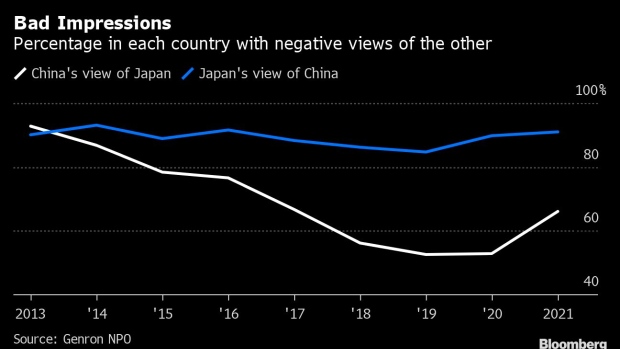Nov 16, 2022
China’s Xi Set for Japan Summit as Mends Ties With US Allies
, Bloomberg News

(Bloomberg) -- Chinese President Xi Jinping and Japanese Prime Minister Fumio Kishida asserted their desire to improve relations and agreed to reopen lines of communication in the first meeting of the leaders of Asia’s two largest economies in three years.
Xi expressed a willingness to work with Japan to maintain a stable relationship at their summit Thursday on the sidelines of the Asia Pacific Economic Cooperation Forum in Bangkok. Kishida, for his part, said both sides had a responsibility to uphold peace and security in the world.
“Today’s meeting was a good start to a dialogue toward a constructive and stable Japan-China relationship,” Kishida told reporters after talks he said lasted about 45 minutes.
The meeting was among steps to thaw the diplomatic chill between China and US allies during summits in Asia this week, with Xi expected to meet New Zealand premier Jacinda Ardern on Friday. Ties between Beijing and Tokyo have frayed in recent years as Japan joined US-led efforts to counter China’s regional influence through institutions such as the Quad group including Australia and India.
The warmer tone echoed Xi’s meeting Monday with President Joe Biden, in which both leaders agreed to restart talks stalled in the wake of US House Speaker Nancy Pelosi’s visit to Taiwan. In remarks to the APEC CEO Summit on Thursday, Xi said the “Asia-Pacific is no one’s backyard and should not become an arena for big power contest.”
“The significance of China-Japan relations hasn’t changed, and will not change,” Xi told Kishida. “I’m willing to work with you and take responsibility as politicians to build China-Japan relations that meet the requirements of the new era.”
A calmer atmosphere may help Kishida re-establish the “constructive and stable relations” he has said he wants with his country’s biggest trading partner. Japan, which tries to strike a balance between China and its sole security ally, the US, has also found itself in a difficult position over Biden administration efforts to counter China’s rise.
The two agreed on an early restart to a high-level economic dialog as well as other ministerial exchanges that been halted due to the pandemic, according to a statement from Japan’s foreign ministry. Foreign Minister Yoshimasa Hayashi will arrange a visit to China, according to a ministry official. Before the pandemic broke out, Xi had been due to pay a state visit to Japan in the spring of 2020.
While Beijing tacked closer to Russia, taking part in joint military exercises near Japan, Kishida has sought stronger ties with NATO, becoming the first Japanese premier to attend the group’s summit in June. At the same time, the massive flow of Chinese tourists to Japan that helped revamp Japan’s image in China in previous years remains at a halt due to Xi’s Covid Zero policy.
Chinese Foreign Minister Wang Yi canceled an August meeting with his Japanese counterpart over a Group of Seven statement criticizing military exercises near Taiwan after the Pelosi visit that included ballistic missiles landing close to Japan. Ships from Japan and China continue to chase one another around disputed islands in the East China Sea and Kishida accused China of infringing on his country’s sovereignty at an Association of Southeast Asian Nations meeting in Phnom Penh on Sunday.
The Japanese premier told reporters after meeting Xi that he raised concerns about stability in the Taiwan Strait as well as about China’s military moves, human rights issues and the detention of Japanese citizens during the talks. But he described the discussions as making progress toward better ties.
The two agreed to swiftly begin operations of an air and maritime hotline and to strengthen communications via a Japan-China national security dialogue, according to Japan’s foreign ministry.
“Japan and China both have great responsibility for the peace and prosperity of the region and the world,” Kishida told Xi at the start of their meeting.
--With assistance from Takashi Hirokawa, Colum Murphy and Ocean Hou.
(Updates with details throughout.)
©2022 Bloomberg L.P.







